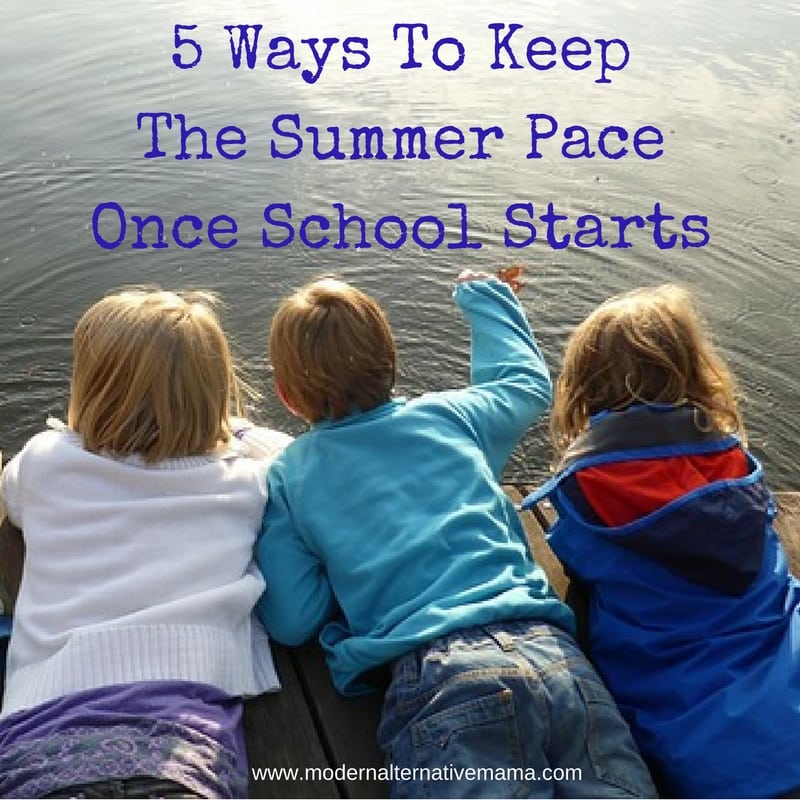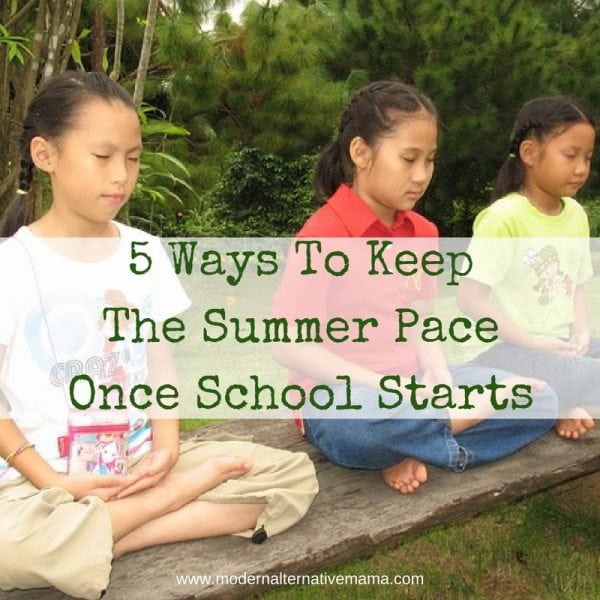When summer is over, and the daily rhythm gets more structured, don’t let the best parts of summer be over as well. Here are 5 tips to keep the summer pace.
By Sandi Schwartz, Contributing Writer
Summer is such an enjoyable, relaxing time for our children, yet when school starts up again everyone feels so tense as we go back to our super structured lives. What if we took some of the aspects of summer that we love so much and kept them going as we enter the new school year? We don’t have to completely say goodbye to playing freely outside, family barbeques, and downtime. As we get wrapped up in school and extracurricular activities, we can all benefit from keeping the summer pace even after school starts.
5 Ways to Keep the Summer Pace Once School Starts
Create Projects to Capture Summer Memories
Keep your summer memories alive by working on the following projects with your kids. Then bring out their creations on a gloomy winter day to brighten their spirits and keep the fun times of summer alive throughout all seasons.
- Put together electronic slideshows of your summer pictures and videos.
- Have your children make collages of their favorite moments from the summer. For example, if you had a day trip to the beach, print out the photos you took and also cut out other images from magazines representing their time at the beach. You can even glue sand and shells to the collage.
- Create memory books using photographs and scrapbooking materials, or have your children draw or paint their own summer memory scenes.
- Ask your children to develop a summer diary, which is great for practicing their writing skills.
- See if they can create a song or play that highlights their favorite parts of summer vacation.
- Fill a memory box of items from their summer experiences, such as ticket stubs, shells, small toys, and postcards.
Play Outside
A huge benefit of summer is the amount of time children get to spend outside playing and exploring nature. From camp to neighborhood swim clubs and parks to vacations at beaches, lakes, and camping sites, there are so many opportunities during summer vacation to be outdoors. However, just because kids will be spending more time in the classroom when school starts it does not mean they should miss out on all of this outdoor fun. Actually, we should put more effort into outdoor play time for our kids once school starts.
Encourage outdoor free play before homework time begins. Free play provides a much-needed break for children before they jump into their late afternoon and evening activities. Free play is so important because it helps children learn to solve their own problems, develop their own interests, learn about the world around them, and practice many skills that are necessary for healthy development. Over time, free play helps a child feel happier, calmer, and more confident.
Additionally, it’s important for them to get outside to play because children, in general, are spending less time outdoors and suffering from nature-deficit disorder. This refers to children having less experience with and connection to nature over the last couple of decades due to technology, overscheduled activities, and safety fears. This is unfortunate because research tells us that spending time in nature can improve both physical and mental health.
Remember to keep this play time simple. Fun doesn’t have to involve expensive toys or games with set rules. Let your children enjoy basic activities like blowing bubbles, making up their own dances, drawing with chalk on the sidewalk, or jumping rope. Here are 5 creative ways to get your children outside.
Stay Calm with Meditation
In order to retain that sense of calm once school starts, we can incorporate mindful meditation in our family’s daily routine. Mindfulness helps us to be fully present in the moment in a non-judgmental way. Several studies indicate that meditation can help children reduce stress, increase attention, and improve academic performance. Meditation gives children a time out to refresh their bodies and minds, and to calm down their nervous system.
When you pick up your children from school, they are probably exhausted and grumpy from a long day of school activities. While you are driving home you can begin to create a calm mood by trying some of these simple meditation techniques:
- Mindful Moment Game: Ask them a question about their day, such as something they are grateful for or a proud moment they had.
- Taillight Meditation: When stopped in traffic or at a red light, practice a taillight meditation while sitting behind other cars. Simply focus on the colors and shapes of the taillights in front of you while remaining relaxed and alert.
- Loving-kindness Meditation: While stuck in traffic or stopped at a light, everyone in the car can stop, breathe, notice their own bodily sensations, and observe their surroundings. You can transform this moment into a positive time by practicing a lovingkindness meditation. This is the practice of directing positive thoughts and well wishes to ourselves and others. The four phrases that you either say out loud or think silently are typically:
May I/you be safe.
May I/you be healthy and strong.
May I/you be happy.
May I/you be peaceful and at ease.
Once you have arrived at home, take a few moments to meditate as a group before the homework chaos begins. Try these 7 simple steps:
- Put the bags down and forget about them for now.
- Sit together on the sofa or in a circle on the floor.
- Ask everyone to close their eyes; you might want to hold hands.
- Take 5 slow breaths in and out together.
- Sit in silence for a minute, or a few minutes if your children can handle it. They will build up to a longer meditation time the more you practice.
- Ask each child to mention one special moment of their day.
- Take two more deep breaths to complete the meditation.
Relate School Work to Summer Fun
What better way to keep the joys of summer alive than to continue talking about them during school projects? Children enjoy learning so much more when we can relate the topics to what they love. Summer is filled with so many fun topics that we can tap into to grab their attention, whether you are working on a math problem or a reading assignment. Consider incorporating the following summer ideas into writing assignments, alphabet and word games, math problems, science projects, and the books you choose to read at night:
- Camp
- Beach and ocean
- Family vacations
- Boats
- Fishing
- Baseball
- Catching fireflies
- Flying kites
- Barbeques
Some examples include writing about experiences from camp or family vacations, counting games using shells collected at the beach, a baseball math game, sink or float science experiments, and a fishing alphabet or sight word game.
Continue to Travel
Even if you have to say goodbye to summer vacation, you can still capture that sense of a break by taking trips throughout the year. Getting out of our daily routine and experiencing new surroundings resets both our mind and body. Vacations give us something to look forward to and new opportunities to explore. Here are some ideas for keeping the spirit of travel alive during the school year:
- Plan a day or weekend trip early in the school year to visit summer fun places like the beach or a waterpark.
- Go camping as a family.
- Plan a trip to a warmer destination when it gets cold outside.
- If a family vacation isn’t in your budget, organize a staycation when you can do some fun summer-type activities like a barbeque, roasting marshmallows, and camping out in your own backyard.








Such good ideas. Especially unstructured outdoor play is like a mini-vacation. When we were kids, my parents would take us out almost every weekend, whether it was visiting friends and exploring their houses and surroundings that often differed from ours or going to a Museum or children’s play. We also often built things in the yard with the neighbours and friends, no matter the weather. More often than not, these also felt refreshing to my parents, I am sure.
[…] 5 Ways to Keep the Summer Pace Once School Starts […]